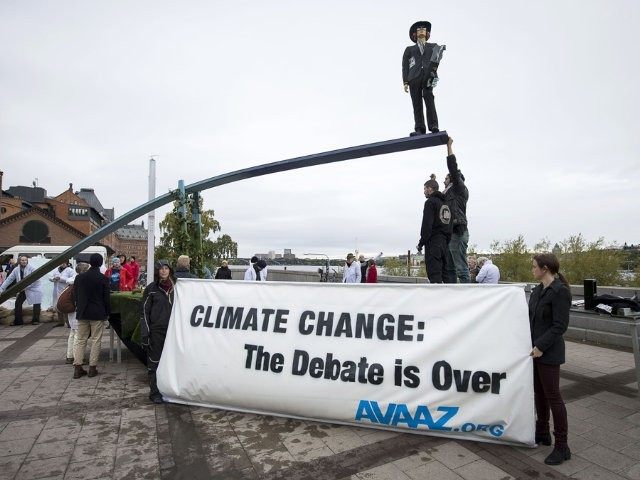The Jesuit flagship publication La Civiltà Cattolica has released a prefatory essay on the theology of the environment to prepare Catholics—and the world—for the Pope’s upcoming encyclical on human ecology. Rather than seriously entertain the objections of climate change skeptics and others who have expressed concerns about the Pope’s letter, however, the article cavalierly dismisses them as unworthy of consideration.
The 14-page essay titled “Protecting the Whole of Creation” offers an unfair caricature of global warming questioners as “opposed to certain scientific findings on climate change.”
Reading through the now-massive volume of writings from climate change skeptics, it is difficult—if not impossible—to find a single one who opposes any “scientific findings.” There are plenty who question scientific models and predictions about what may or may not happen in the future. There are many who question the interpretation of scientific data and the theoretical conclusions that are drawn based on those interpretations. There are even those who question the reliability of certain data collection methods, especially those used in the past, which allow for a historical picture of climate change to be sketched. But questioning scientific findings? Not one.
This is a pity, since the early part of the article is well researched and helpful for anyone interesting in contextualizing Pope Francis’ encyclical letter in ongoing magisterial teaching. The authors present a synopsis of what the Popes from Paul VI to Benedict XVI have said about responsible stewardship of the environment in the last 45 years, which proves both illuminating and encouraging.
Moreover, much of the essay is thoughtful, carefully avoiding the panicky language of so much of environmentalist writing today. It even gently pokes fun at such scare tactics, distancing itself from the tragicomic position that it accurately describes:
The question now is: what kind of condition do the challenges of ecology and climate change place us ask of us? «A moment of doom» one could say: man’s greed, stupidity, carelessness and pride have caused so much irreversible damage that we find ourselves at the very edge of self-destruction.
The article further acknowledges that “the issues at stake are complex: above all at the scientific level, then political and finally at the economic and commercial level,” which is one of the major assertions of climate skeptics who caution prudence in racing ahead to legislate sweeping changes in human behavior based on uncertain conjecture.
How unfortunate, then, that the essay makes only passing reference to the real concerns voiced by Christians and other people of good will to a radical environmental agenda that shares a platform with population control advocates and materialists.
The article’s summary of these concerns avoids the deeper questions of most Christians, and limits itself instead to a superficial caricature.
There are a few who debate whether the Church in general, and specifically the Pope, should enter the debate at all. Those most opposed to certain scientific findings on climate change also seem most in favour of the continued exploitation of fossil fuels. It could be argued that the Pope has more important things to worry about than the environment. His task as pastor should be the salvation of souls. Some may think that faith is an optional add-on to ecological commitment. That is like saying that the foundation is an optional add-on for a building. For it is by faith we know that we are creatures, not the accidental or fortuitous products of blind forces or chance coincidences.
The fact is, no one disagrees with the importance of clean rivers, clean air, and clean oceans. No one disagrees regarding the moral imperative of feeding the hungry, clothing the naked, and instructing the ignorant. Many, however, disagree with the United Nations climate change platform and the agenda behind it, including a radical diminution of fossil fuel use that stands to hurt the world’s poor more than any other demographic group.
Another serious problem with the article is the misleading statement that “Francis has an anthropological vision, but not an anthropocentric vision in the reductive sense” concerning the environment. Despite the qualifying clause “in the reductive sense,” this is patently false. What distinguishes a Christian, biblically based view of environmental stewardship from a secular, materialistic view is precisely its anthropocentrism—the environment matters because people matter. Whereas proponents of “deep ecology” can look upon human beings as a “plague” or a “cancer” for the planet, Christians will always see creation as the “garden” that humans were given as their home.
During his January trip to the Philippines, in fact, Pope Francis said that men and women are “given dominion over creation,” and as “stewards of God’s creation, we are called to make the earth a beautiful garden for the human family.”
The very words we use—“environment” and “ecology”—both bespeak this anthropocentrism. “Environment” literally means “what is around” (us) and demands a point of reference, which is humanity. Similarly, the word “ecology” is thoroughly anthropocentric in its roots. From the Greek oikos + logos, ecology means the science of the “home,” of the “garden” in which we live.
The Pope has pointedly subtitled his forthcoming encyclical, Laudato Sii, “On the Care of our Common Home,” underscoring once again this anthropocentrism.
Despite its two major flaws of discounting skeptics’ concerns and misrepresenting Christian anthropocentrism, “Protecting the Whole of Creation” offers a useful introduction to Francis’ encyclical and helps frame the question of human ecology in a broader theology of the environment.
Its summary of the Pope’s intentions is nothing if not encouraging:
“His goal is not to speculate nor to support this or that theory, but to invite people of goodwill to consider thoroughly their responsibility for future generations, and to act accordingly.”
Amen to that.
Follow Thomas D. Williams on Twitter @tdwilliamsrome

COMMENTS
Please let us know if you're having issues with commenting.